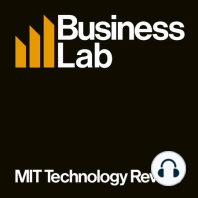54 min listen
Feeding the World by AI, Machine Learning, and the Cloud
FromBusiness Lab
ratings:
Length:
26 minutes
Released:
Nov 16, 2022
Format:
Podcast episode
Description
Although the world population has continued to steadily increase, farming practices have largely remained the same. Amid this growth, climate change poses great challenges to the agricultural industry and its capacity to feed the world sustainably. According to the World Bank, 70% of the world’s fresh water is used in agriculture and droughts and heat waves continue to threaten crops. And that is where the challenge arises to feed the world while mitigating the environmental effects of agricultural practices.
The answer to this challenge, according to Thomas Jung, head of IT Research and Development at Syngenta, is regenerative agriculture. Just as important as clean water and clean air, soil is the critical foundation of agriculture. The crux of regenerative agriculture is to grow more food with less environmental impact by enhancing the health of soil.
“So not much has changed, but we need to feed more and more people,” he continues “How do we address this challenge of feeding the world in a sustainable fashion without exploiting our soils more?”
Regenerative agriculture efforts look to find solutions to help plants stay healthy, find solutions to make crops more resistant to climate change-induced droughts and heatwaves, and use less water in farming.
Therefore, what’s necessary is, “moving beyond the traditional agriculture and the way we've been doing this for probably 100 years or more. I mean, this is a leap,” says Jung. “This is an agricultural revolution that is ongoing, and artificial intelligence will play the decisive role in it.”
Although farmers have invaluable knowledge of their own crops and fields, says Jung, AI and machine learning tools can be instrumental in cataloging greater detail, refining algorithms, and creating recommendations for solutions. As more data is collected and algorithms continue to improve to create new innovations, we’ll be even closer to understanding our planetary ecosystem, says Jung. Breakthroughs like soil regeneration, really living with sustainable agriculture across disciplines are achievable within the next three years.
“There's a lot of advocacy for open source, for democratized data, for fair data, and we need to bring that to the industry,” says Jung. “This can't just be an NGO or a volunteering thing, that this is how I believe our industry needs to work. So we really want to share, we want to lead by example, we want to nurture the community, and through that, win altogether.”
This episode of Business Lab is produced in association with Infosys Cobalt.
The answer to this challenge, according to Thomas Jung, head of IT Research and Development at Syngenta, is regenerative agriculture. Just as important as clean water and clean air, soil is the critical foundation of agriculture. The crux of regenerative agriculture is to grow more food with less environmental impact by enhancing the health of soil.
“So not much has changed, but we need to feed more and more people,” he continues “How do we address this challenge of feeding the world in a sustainable fashion without exploiting our soils more?”
Regenerative agriculture efforts look to find solutions to help plants stay healthy, find solutions to make crops more resistant to climate change-induced droughts and heatwaves, and use less water in farming.
Therefore, what’s necessary is, “moving beyond the traditional agriculture and the way we've been doing this for probably 100 years or more. I mean, this is a leap,” says Jung. “This is an agricultural revolution that is ongoing, and artificial intelligence will play the decisive role in it.”
Although farmers have invaluable knowledge of their own crops and fields, says Jung, AI and machine learning tools can be instrumental in cataloging greater detail, refining algorithms, and creating recommendations for solutions. As more data is collected and algorithms continue to improve to create new innovations, we’ll be even closer to understanding our planetary ecosystem, says Jung. Breakthroughs like soil regeneration, really living with sustainable agriculture across disciplines are achievable within the next three years.
“There's a lot of advocacy for open source, for democratized data, for fair data, and we need to bring that to the industry,” says Jung. “This can't just be an NGO or a volunteering thing, that this is how I believe our industry needs to work. So we really want to share, we want to lead by example, we want to nurture the community, and through that, win altogether.”
This episode of Business Lab is produced in association with Infosys Cobalt.
Released:
Nov 16, 2022
Format:
Podcast episode
Titles in the series (61)
Cybersecurity in 2020: The rise of the CISO: Data breaches taught companies hard lessons in 2019. One key takeaway: they need a chief information security officer, says Forrester’s Stephanie Balaouras. by Business Lab
